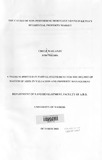| dc.description.abstract | Mortgages have generally been understood to comprise the lending of money by mortgage
financial institutions against the security of a fixed property that should hold a value greater
than that of the value advanced. This view creates the impression that mortgage financing is
generally low risk as the value of the property covers the loan and so the loan is adequately
secured should there be a default in repayments. The reality however is that mortgage
financial institutions experience bad debts similar to and in some cases of higher levels than
found in the banking industry as whole.
Interest rates on mortgages in Kenya have fluctuated between 18 per cent and 30 per cent in
the last 10 years. In addition to this, economic growth in the country has been slow, with
some years registering negative growth. For example in year 2000, the country registered a
growth rate of negative 0.3 per cent (lEA, 2002). This has led to economic woes in the
productive sectors of the economy and such consequences as retrenchments as firms and
industries were forced to shut down or reduce their operations. This not only led to reduced
demand for new mortgages because of rising unemployment but also to a high number of
mortgagees who have been unable to service their loans as per the mortgage contracts.
Mortgage defaults have led to financial institutions experience high levels of non performing
loans
Unfortunately, lenders have not identified with the problems facing their customers. Instead
of offering discounts on interest rates and more lenient repayment terms in order to recover
their money, they levy additional payments as a punishment for a mortgagees incapacity to
pay, equating incapacity with unwillingness to pay. They appear to be in a position of power
and often facelittle or no competition as borrowers have experienced when their properties
are auctioned.
This study has sought to identify the main causes of non performing mortgage loans from
both the borrowers and mortgage finance companies. The main ones have been identified and
expounded. The study has also sought to identify the solutions from the perspectives of
borrowers and lenders as well as those advanced by Central Bank of Kenya, which is the
regulator of financial systems and practices in the country.
Various recommendations which are aimed at reducing the current high level of non
performing mortgage loans have been given as well as measures which would ensure that the
mortgage finance system is equitable and sustainable. | |

